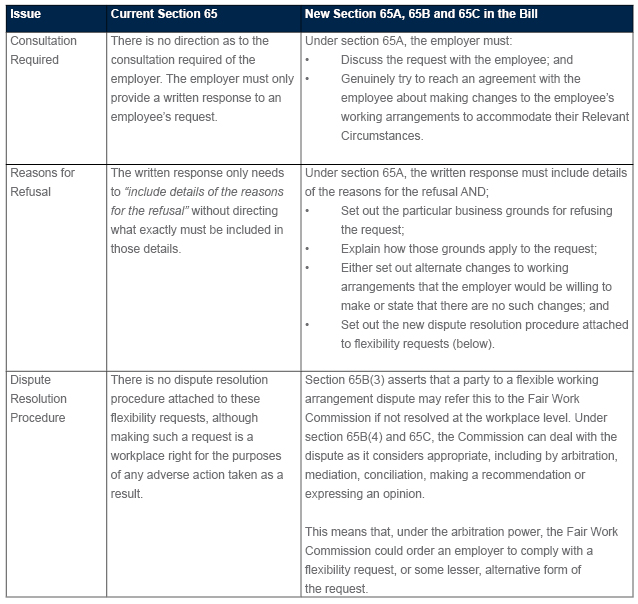LEGAL UPDATE
LEGAL UPDATE
FLEXIBLE WORK ARRANGEMENTS UNDER THE FAIR WORK LEGISLATION AMENDMENT (SECURE JOBS, BETTER PAY) BILL 2022
Authors: Emma Pritchard & Zeb Holmes
The demand for flexible work arrangements exploded during the COVID-19 pandemic. While physical attendance has been slowly increasing with changes to public health restrictions under a “COVID-normal” approach, the benchmark for “normal” office attendance has definitely shifted. With the realisation that workplaces can accommodate remote work and Teams meetings, many workplaces are embracing a more flexible, hybrid model of attendance. This approach has the added benefit of attracting and retaining employees, particularly those who faced difficulties under more rigid models of attendance.
The Federal Government has now given added assistance to those employees seeking to negotiate flexible work arrangements, as part of the Fair Work Legislation Amendment (Secure Jobs, Better Pay) Bill 2022 (“Bill”) introduced into Parliament on 27 October 2022. While the Bill maintains many previous features of the flexible work arrangement regime, it does assist employees in these negotiations and limits what previously seemed to be the employer’s unfettered discretion to refuse such requests. We set out below a summary of the Bill, comparing it to the current position under section 65 of the Fair Work Act 2009 (Cth) (“FWA”), including the main proposed changes for employers to consider around consultation, reasons for refusal and dispute resolution procedures.
Flexible Working Arrangements – the Old and the New
The Bill does not change the group of employees who can request changes to their hours, patterns or location of work. Employees can still only request a flexible working arrangement if they have 12 months continuous service (with casual employees also requiring a reasonable expectation of continuous employment) together with any of the circumstances at section 65(1A) applying; namely, that the employee is a parent or has parental responsibilities, is a carer, has a disability, is 55 or older, is experiencing domestic violence or needs to support an immediate family member experiencing domestic violence (together, “Relevant Circumstances”). If the employee has the relevant length of service, and a Relevant Circumstance, they may request a flexible working arrangement in writing. Similarly unchanged in the Bill, an employer must respond within 21 days to such a request with written reasons and can refuse based on “reasonable business grounds”.
The primary difference between the current section 65 in the FWA and the Bill are the requirements of the employer in considering the request, giving reasons for any refusal and the potential review of the refusal of such requests by the Fair Work Commission. We set out these primary changes further below:
Conclusion
The above changes in the Bill will make the flexible work arrangement regime more favourable to employees. The Bill introduces limitations on an employer’s discretion to refuse a request for flexible work arrangements, added requirements for employers to explain their reasons, and employees could potentially compel an employer to comply with their request through an application to the Fair Work Commission.
The upshot of these changes is that employers will no longer be able to take a “one size fits all” approach to flexible workplace requests and will need to meaningfully review these requests, engage with both the employee and the business’ needs, and consider whether any alternate arrangement can be made that accommodate legitimate requests for flexible work.
If you require any further assistance or advice, please contact our Harmers legal team on +61 2 9267 4322.
© Copyright Harmers Workplace Lawyers 2022. All rights reserved. No part of this alert may be reproduced, in whole or in part, by any means whatsoever, without the prior written consent of Harmers Workplace Lawyers.
Disclaimer: This news alert provides a summary only of the subject matter covered without the assumption of a duty of care by the firm. No person should rely on the contents as a substitute for legal or other professional advice.

